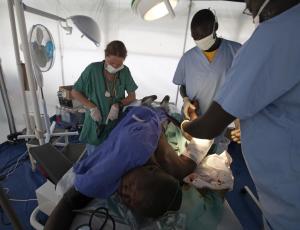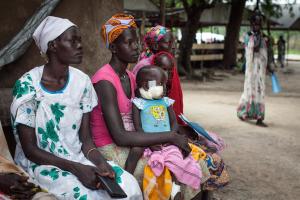August 31, 2014 (JUBA) – South Sudanese president Salva Kiir has warned rebel forces allied to former vice-president Riek Machar could become a regional security threat unless the international community closely monitors their activities.

He has also called for regional and international assistance to help his administration contain the country’s rebellion.
“If they are not given meaningful and serious attention by the region and the international community involved in this peace process, I am sure that their activities would reach other countries and when this happened, the conflict will be a regional issue,” he said.
If today like they did before, they attack the oil area, they will not spare anybody. This is [a] terrorist act,” he added.
CITIZENS IGNORED
Kiir has accused his former deputy of ignoring the suffering of the South Sudanese people, who continue to be affected by the more than eight-month-long conflict in the country.
“When we signed the protocol of agreed principles, it was not because we are fully satisfied with the contents of the document, but because of the importance of peace to our people. But Riek and his group jumped up and refused to sign,” said Kiir.
“We signed the protocol because we wanted to accelerate negotiation process so that peace and stability returns to the areas which have been affected by this senseless war,” he added.
The president made the comments while speaking to a number of government officials and military officers, as well as religious and civil society leaders, who had paid him a visit at his residence to congratulate him on the signing the protocol of agreed principles.
President Kiir’s administration has been engaged in an armed struggle with pro-Machar rebels, since mid-December last year when a political dispute within the country’s ruling party (SPLM) descended into violence.
REBELS LACK HUMANITY
He said rebel forces lacked “any sense of humanity”, citing the killing of elderly and sick people as they lay in their hospital beds in Bor, Malakal and Bentiu, as well as the alleged gang rape of women.
“They do things which are inhuman,” the president Kiir said.
Machar’s rebel faction, meanwhile, accuse Kiir of exhibiting dictatorial tendencies, failing to tackle endemic corruption, poor foreign relations and tribalism, among others.
Ongoing peace talks, which are being mediated by the Intergovernmental Authority on Development (IGAD) in the Ethiopian capital, Addis Ababa, have failed to halt the violence on the ground, with both sides accusing each other of violating a January ceasefire deal.
However, Kiir said his administration was prepared to accept the outcome of IGAD-led negotiations with the rebel faction, provided it meets the desires of the general population.
SOUTH SUDAN “AT WAR WITH ITSELF”
On a recent visit to Uganda he told MPs there that South Sudan was a country “at war with itself” because certain elements within the government had attempted to seize power from him by force.
“I told them (Ugandan MPs) that the war we are fighting was imposed on our people by some of our brothers who did not want to wait [until] elections like the way it is done here in Uganda and elsewhere in the world. They wanted to get the power by bullets,” he said.
“We said ‘no, you [must] wait for elections, so that you get the power by ballots. If our people see you would be any better’, but they refused. And in December they tried to take the government by force. They used their influence in the army to divide our people. This was why Uganda and other friends came in,” president Kiir explained.
Kiir travelled to Uganda last month ahead of an IGAD heads of state and government summit on peace and security in Addis Ababa, Ethiopia, in which the South Sudan crisis was among the top agenda items for discussion.










